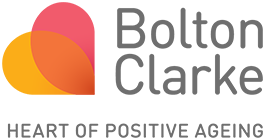Home care clients to co-design frailty interventions
A Melbourne research collaboration is bringing together frail hospital and home care clients and clinicians to improve health outcomes, overcome resistance to treatment and help build resilience.
The Being Your Best Program - a collaboration between Bolton Clarke, Cabrini Health, Alfred Health/Monash University and Monash Health/Deakin University – is working with patients and consumer advisory groups to co-design key interventions for frailty in the community.
The interventions will be piloted with Bolton Clarke at home support clients and older patients admitted to emergency departments in three of Melbourne’s metropolitan tertiary acute hospitals.
Frail people are vulnerable and at increased risk of poor outcomes or death in the event of illness or injury. The condition affects around half of all Australians aged over 65.
Bolton Clarke Research Institute Principal Research Fellow Judy Lowthian said interventions including physical activity, cognitive training, nutrition and social support could significantly improve outcomes.
“There’s good evidence to show you can slow the trajectory of functional decline in frail older adults, and even prevent further deterioration,” she said.
“We are looking at people who have just been sent home from hospital, because that’s when people are more vulnerable.
“We know that physical exercise like strength and resistance training is effective and it’s more effective if you do it in a group situation.
“We also know we have to look at nutritional needs because frailty can include losing weight.
“Cognitive training, like word games and cross words, and social support are also valuable – people who have a tendency to be frail also tend to become more isolated.”
Dr Lowthian said involving clients and clinicians in the co-design process was important because previous research showed many patients did not take part in existing recommended interventions.
Pilot interventions will begin in 2020 and researchers will measure results at six and 12 months to determine their feasibility and sustainability.
The two-year project has received $198,727 through the 2019 Monash Partners Medical Research Future Fund Rapid Applied Research Translation funding round.

